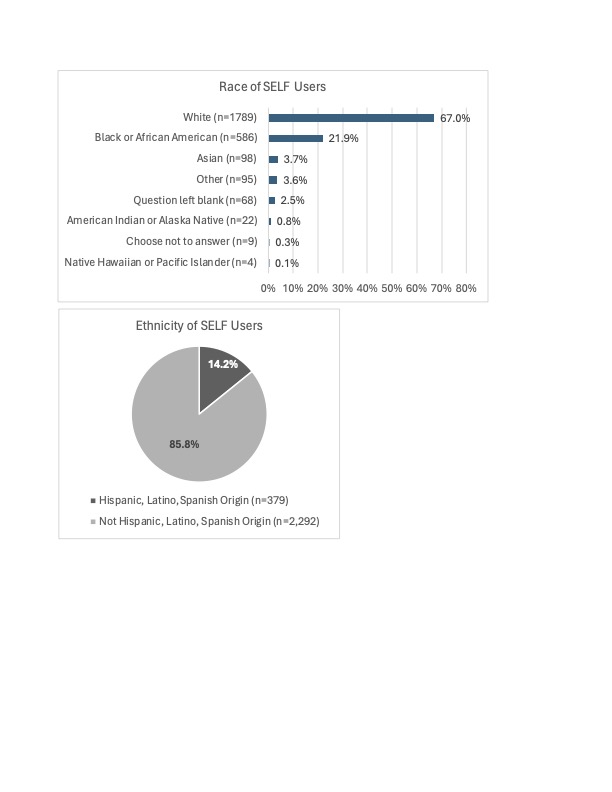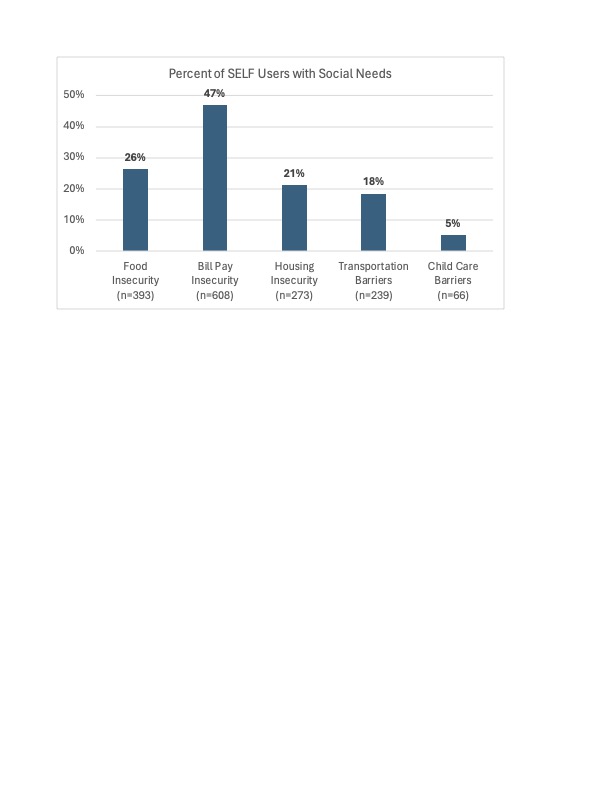Session Information
Session Type: Poster Session C
Session Time: 10:30AM-12:30PM
Background/Purpose: As part of a 5-year cooperative agreement with the Centers for Disease Control and Prevention, The Lupus Foundation of America (LFA) has implemented the digital lupus self-management (SM) education program, Strategies to Embrace Living with Lupus Fearlessly (SELF). Launched in January 2022, SELF is a user-tailored program for people with lupus (PWL) that offers skill-building activities for four key lupus SM behaviors (managing symptoms, managing stress, managing medication, and working with a healthcare team) as well as symptom and medication trackers, a journal, and links to support resources. It is known that lupus disproportionately impacts women, specifically those from racial and ethnic minority groups, in terms of prevalence, morbidity, and mortality. Adverse social determinants of health (SDOH) can further exacerbate the impact of lupus on vulnerable PWL. By understanding the reach of SELF through user demographics and social needs, we aim to identify opportunities for broader dissemination.
Methods: From January 2022 to September 2023, SELF collected information on demographics and social needs from users who completed the intake assessment (n=2671). Social needs questions are from the AAFP Social Needs Screening Tool (short form) for selected needs that can be sufficiently resourced in SELF. Questions were modified to reduce response burden; some were summarized by category (e.g., food insecurity, bill pay insecurity, housing insecurity) (Figure 2).
Results: SELF users identified primarily as female (95.8%, n=2558) with a mean age of 46.6 years (13.2 SD). Most users were diagnosed by a rheumatologist (98.2%). Race is reported in Figure 1 with 67.0% White, 21.9% Black or African American, 3.7% Asian, 0.8% American Indian or Alaska Native, and 0.1% Native Hawaiian or Pacific Islander. Users were 14.2% of Hispanic, Latino, or Spanish origin. Of SELF users who answered social needs questions (n=1293), those who screened positive were: 26% with food insecurity, 47% with bill pay insecurity, 21% with housing insecurity, 18% with distance/transportation barriers, and 5% with childcare barriers (Figure 2).
Conclusion: There is great opportunity for SELF to reach a younger and more racially and ethnically representative population of PWL. Although we did not have sufficient data to analyze social needs by race in detail, broadly speaking, we saw that SELF users from racial and ethnic minority groups have higher needs. With broader dissemination of SELF, it is likely that reported social needs will grow. Moreover, PWL with social needs may face greater challenges in learning SM skills. To serve PWL with greater needs, SELF will need to grow with its users in terms of accessibility and health literacy.
Disclosures: K. Carpenter: None; M. French: None; S. Johnson: None; J. Johnson: ProChange Behavior Systems, 3; A. Holden: None; J. Buie: None; M. Miller: None; M. Crimmings: None.
To cite this abstract in AMA style:
Carpenter K, French M, Johnson S, Johnson J, Holden A, Buie J, Miller M, Crimmings M. Reaching Those in Need: Understanding the Reach of a Digital Program for Lupus Self-Management Education [abstract]. Arthritis Rheumatol. 2024; 76 (suppl 9). https://acrabstracts.org/abstract/reaching-those-in-need-understanding-the-reach-of-a-digital-program-for-lupus-self-management-education/. Accessed .« Back to ACR Convergence 2024
ACR Meeting Abstracts - https://acrabstracts.org/abstract/reaching-those-in-need-understanding-the-reach-of-a-digital-program-for-lupus-self-management-education/


